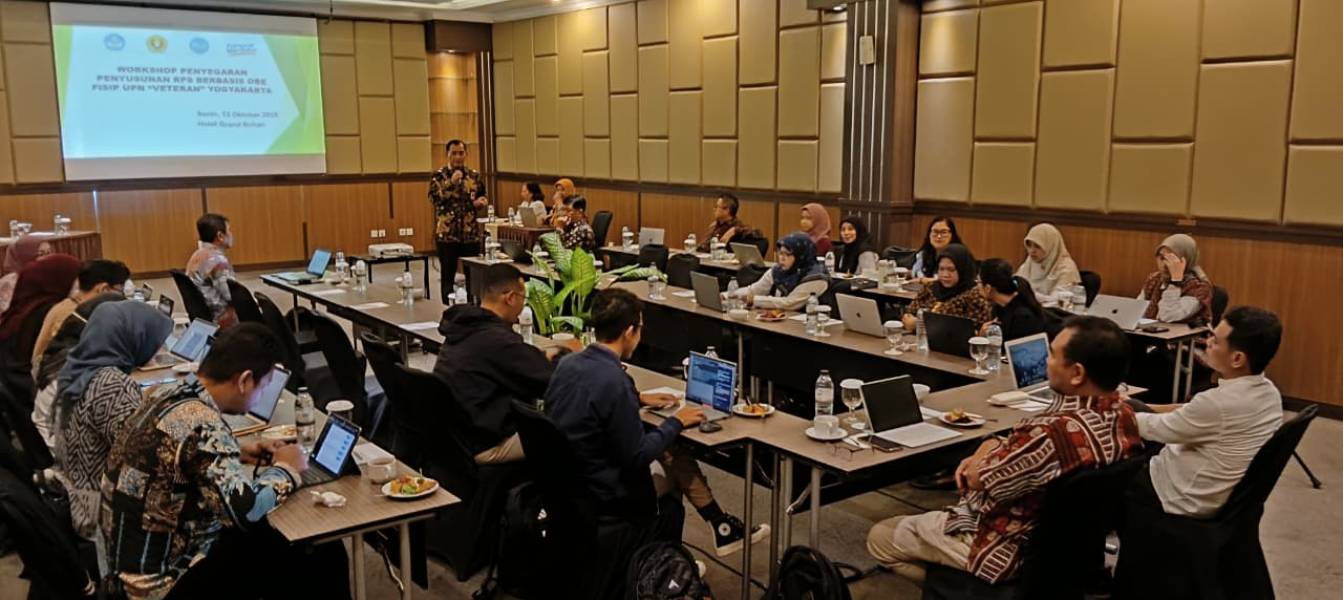FISIP UPN “Veteran” Yogyakarta Holds Workshop on Developing Outcome-Based Education (OBE)-Oriented Course Learning Plans
Yogyakarta, October 15, 2025 — As part of its ongoing commitment to strengthening the implementation of Outcome-Based Education (OBE), the Faculty of Social and Political Sciences (FISIP) of UPN “Veteran” Yogyakarta organized a Workshop on Developing Outcome-Based Course Learning Plans (RPS) on Wednesday, October 15, 2025.
The workshop featured Dr. Herlina Jayadianti, S.T., M.T., Head of the Center for Learning Development at the Institute for Learning Development and Educational Quality Assurance (LPMPP) UPNVY, as the keynote speaker. The participants included heads of departments and study programs within FISIP, as well as lecturers serving on each program’s curriculum development team.
In opening remarks, the Dean of FISIP UPN “Veteran” Yogyakarta, Dr. Susanta, M.Si emphasized that a well-designed Rencana Pembelajaran Semester (RPS) — or Course Learning Plan — is a vital component of a high-quality and measurable learning process.
“The RPS serves as a key agreement between lecturers and students in the learning process. At FISIP, our curriculum is fully based on the OBE framework, which means each RPS must reflect specific, measurable, and relevant learning outcomes aligned with the graduate profile,” the Dean stated.
He further explained that the quality of the RPS is also a critical aspect evaluated by accreditation assessors. Moreover, developing RPSs that incorporate case-based learning and project-based learning approaches supports the university’s Key Performance Indicators (IKU), particularly in improving the quality and innovation of teaching methods.
During her presentation, Dr. Herlina provided a comprehensive explanation of the fundamental principles of OBE, which focus on student learning outcomes (CPL) and their alignment with curriculum components such as courses, learning plans, and assessment methods.
“OBE requires lecturers to design learning that emphasizes what students are expected to achieve — not merely what is taught. Therefore, an RPS must be structured logically and measurably, supported by teaching strategies that align with the intended learning outcomes,” she explained.
Participants were also guided to re-examine the coherence between CPL, CPMK, sub-CPMK, learning methods, and assessment strategies, ensuring that their RPS demonstrates strong and consistent alignment in accordance with OBE principles.
Through this workshop, FISIP reaffirms its commitment to ensuring that each study program develops RPS documents that are fully aligned with the OBE curriculum and contribute to achieving the university’s goals in innovative teaching.
The event also served as a platform for interdepartmental collaboration and sharing of best practices in course design, fostering a collective effort to continuously improve the overall quality of teaching and learning within the faculty.
“We hope that after this workshop, lecturers will be able to refine and enhance their RPS documents, leading to more effective, measurable, and impactful learning experiences for students,” concluded the Dean of FISIP.

 English
English Indonesia
Indonesia